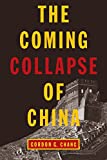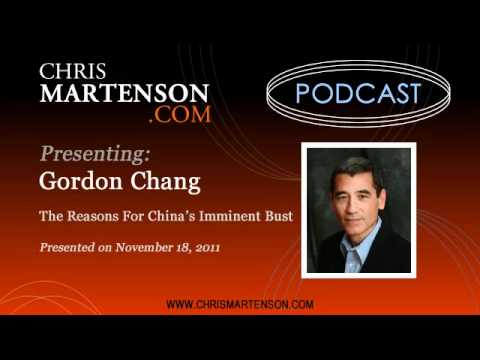 The global dominant narrative about China is wrong, claims Gordon Chang. Don't expect it to be the 'pocketbook of last resort' that will rescue world markets from their current malaise.
The global dominant narrative about China is wrong, claims Gordon Chang. Don't expect it to be the 'pocketbook of last resort' that will rescue world markets from their current malaise.
And don't expect its remarkable economic growth to continue. In fact, expect a "hard landing" for China – and soon.
Forbes.com columnist and international lawyer Gordon Chang has spent much of his time since the early 1980s working and living in China. His primary knowledge of the country and his relationships there give him a superior understanding to how its economy is actually faring than many analysts based in the West. And what he sees today doesn't inspire confidence.
We are seeing the first real signs of slowdown in China's economic growth looking at the year-over-year numbers for the past several months. Car sales have decreased nearly 5% since last year, and property values are beginning to plummet in key markets (30% in October alone in Shanghai).
Gordon sees these as the inevitable harbingers of a coming collapse in China due to excessive stimulus policies the government undertook starting in 2009. The bubbles and malinvestment created by this stimulus have not been addressed, and increasing weakness and transitions inside the political system are making it less likely they will be before market forces intervene.
On the Repercussions of Excessive Stimulus
Inefficiency eventually catches up with every economy. They have a semi-closed system so that they are not necessarily subject to the principles of economics in the same way that we are, but they can only delay the inevitable. They cannot prevent it entirely, and that is really going to be their problem. Because they have done a lot which just does not make economic sense. I mean it might make sense in terms of rapid buildup of an economy, but they have to pay a price. And they have not paid their price yet.
The one thing that people say is "These Chinese leaders are so great at economic management because they got through 2008-2009 and they had enormous double-digit growth while the rest of us were suffering." Well yes, they did that but they did that at great cost.
And so for instance in 2009, the first full year of their stimulus plan, they dumped something like $1.1 trillion into a then $4.3 trillion economy. And so did they create growth? Yes, they did, but they also created a stock market bubble, a property market bubble, and inflation. And they have yet to deal with the property market and the inflation problems. Those are dislocations that they do not have the answers to. I would rather have our economic problems than theirs any day of the week.
On Growing Political & Social Instability
Starting at the end of next year, the Communist party is going to change the officers of their Politburo Standing Committee, the apex of political power in China. We are going to have a new General Party Secretary. And then in the early part of 2013, the government officers change. And sometime after that, the all-important Central Military Commission has a revamp of membership. And so at this time of political transition, the important economic decisions are not being made. But it is even worse than that, because corruption indeed is engulfing the political system. It is causing so much friction in society. The Communist Party is not able to mediate conflict and its only answer is to increase coercion.
And that is why you have survey after survey of the rich and the super-rich, they talk about leaving China. It is not the poor who are going, which we have seen in many waves throughout the last couple hundred years, now the rich are thinking of getting out. They are getting passports, they are putting their families offshore, and this is of concern because this is a leading indicator.
If you go about 25 miles south of where I live, and go to Princeton, New Jersey, you will see a lot of beautiful homes. I mean, they are all paid for, they have got a wife there, they have kids, and they have one or two Mercedes in the driveway. It is the perfect American family, except one thing is missing, and that is Dad. Dad is a senior official in Beijing and he is stealing as much money as he can. And at maybe not the first sign of trouble, but perhaps the second sign of trouble, he is on the United flight to New York, because he is not going to stay to defend a regime that is shaking. And that is one of the reasons why I think we have to be concerned about the way the Chinese economy is going, because the Chinese rich are starting to see the signs and are beginning to bail out.
We are talking about the people who have benefited the most from this system. And they can see the problems at the top of society. We have now a weak General Party Secretary, Hu Jintao, and he is going to be followed by probably by someone who is just as weak, especially in his beginning years, Xi Jinping. This is a political system that will not be able to make the decisions and to implement them that everyone knows have to be made. And that is why, for instance, we have not seen much in the way of reform over the last five years. In fact, we have seen a reversal of reform. And most of the conditions that have given rise to China's extraordinary growth either no longer exist or are disappearing fast. And so this is an economy in trouble.
On the Popping of China's Real-Esate Bubble
There was just too much money in the economy and so people then poured money into apartments. And China has gone on a tear building ghost cities and all the rest of it. And now the progression that you talked about -- skyrocketing prices and then stable prices, selling volume, and then property price declines -- is what we are seeing in China.
In October, last month, prices in places like Shanghai declined 30%, as we saw developers start to offer these enormous discounts. And by the way, these discounts were so big that people who bought at earlier stages in these same developments, where these discounts were being offered have now taken to the streets complaining if you are giving 30% discounts to these other guys, then give it to me as well. And so we have not got a little bit of social unrest because of falling property prices.
In Wenzhou, which is in prosperous Zhejiang Province, which was perhaps the most prosperous province up to about a year ago, developers are, one developer is now offering BMWs to the first 150 buyers of apartments. And this is just a sign that property prices have not only softened, but they are starting to fall quickly.
You know, every market has to go to equilibrium. There are too many apartments in China and not enough buyers and occupiers. And it was going to go to equilibrium in some fashion. What is really surprising observers is that the rapidity at which we see this move to equilibrium. Last year there were – in about, I guess it was April or May, the state grid in China reported there were 64.5 million apartments that showed no electricity usage for six consecutive months. That is enough housing for 200 million people, but yet Beijing was decreeing the building of 30 to 50 million more apartment units....
But at the end of the day, there has got to be a correction. And what goes up fast comes down fast. And what we are seeing is the down phase. The only issue is whether Beijing can stop the down phase by administrative measures. But so far the Chinese leaders, Premier Wen Jiabao, last Sunday said "nope, we are going to stay with these tightening measures." And that has really created great pessimism in the Chinese property market...
And so really what we have is a government now that is really trying to bring the property market down. And of course it wants to do so gradually, you know, orderly. But as you say, it is a bubble, there is a pin and the problem is that Chinese leaders cannot manage the process of bringing the property market down to equilibrium....
When China's elite analysts start talking about prices being 50% of where they are this year that means that they are probably privately thinking that no, prices will not halve: they might go down even further than that. And that is really a problem because that mentality, once it gets embedded in people's minds in China really means that, Chinese leaders then have very few tools in which to prop up the property market.
Click the play button below to listen to Chris' interview with Gordon Chang (runtime 40m:55s):
iTunes: Play/Download/Subscribe to the Podcast
Download/Play the Podcast
Report a Problem Playing the Podcast
Or click here to read the full transcript.
Gordon G. Chang is the author of Nuclear Showdown: North Korea Takes On the World, released by Random House in January 2006. Showdown focuses on nuclear proliferation in general and the North Korean crisis in particular. His first book is The Coming Collapse of China (Random House, August 2001). He is a columnist at Forbes.com and The Daily.
He lived and worked in China and Hong Kong for almost two decades, most recently in Shanghai, as Counsel to the American law firm Paul Weiss and earlier in Hong Kong as Partner in the international law firm Baker & McKenzie.
Our series of podcast interviews with notable minds includes:
- Gordon Chang
- Turd Ferguson
- Eric Janszen
- Paul Brodsky
- Carolyn Baker
- David Stockman
- Rob Hopkins
- Joel Salatin
- Charles Hugh Smith
- Frank Barbera
- Nate Hagens
- David Morgan
- James Turk
- Eric Sprott
- John Rubino
- Addison Wiggin
- Simon Black
- Axel Merk
- Paul Tustain
- Francis Koster
- Dogs_In_A_Pile
- Bud Conrad
- John Williams
- Robert McFarlane
- David Collum
- Joe Saluzzi
- Jim Rogers
- Bill Fleckenstein
- Marc Faber
- Willet Kempton
- Dan Ariely
- Ted Butler
This is a companion discussion topic for the original entry at https://peakprosperity.com/gordon-chang-the-reasons-for-chinas-imminent-bust-2/
